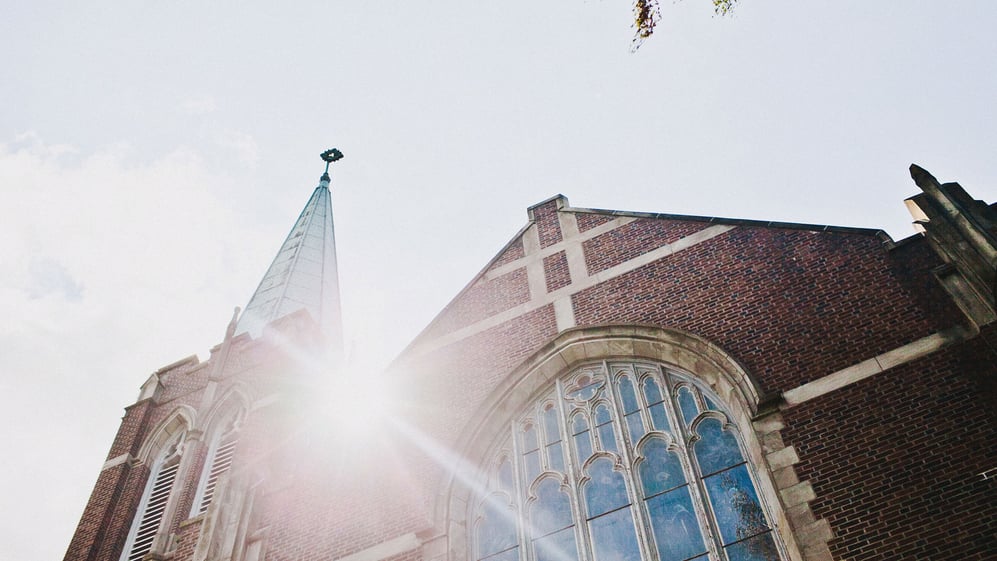You know your relationship is going really well when one of you says, “Can we do this for the rest of our lives?” This is more than just a perfect date or that thirtieth wedding anniversary vacation to Hawaii. Those are good times too, but it’s really wonderful when an ordinary day together that ends with macaroni and cheese leaves you saying, “Can we do this forever?”
In Baptism and the Lord’s Supper, we have high-point moments in our relationship with God. Those are moments we never want to change. Let’s not leave the baptismal font, with its sparkling water and the words of our washing. Let’s stay at the altar rail, with the Lord’s Supper assuring us of forgiveness through His body and blood.
But we can’t be at the font or altar all day. We have more to our life with God, more places to be, and more to do together. We have our worship and our vocation. Through faith, we can see that our work is a way to do God’s work for the benefit of the world. The good news is that worship and our vocation happen every day. Yes, we can do this for the rest of our lives.
Let’s Go Home
When do you say, “Let’s go home”? Maybe when the meal was undercooked and overpriced, when the extra butter on the popcorn didn’t redeem the movie, or when the kids were hitting one another even before you got in the minivan. “Let’s go home.” We might not be doing very well right now, but we’ll be better when we go home. There’s food we can trust, and everyone has his or her own place to sit. When things haven’t gone according to plan and we show it, let’s go home.
Worship is our home with the family of God. We’ll speak of our weekly worship; for convenience, let’s say Sunday morning, though we can worship every day of the week. But on Sunday morning, we find our place with the family of God, sharing the relationship that God has with us. There is a real place to fill. You may have that place picked out already, the pew where you always sit.
But worship with the family of God is more than the pew on the right side. It’s sharing the common experiences that brought us into this relationship with God. Many congregations have the baptismal font at the entrance to remind us that we entered our relationship with God through His gift of Baptism. Once we’re seated and worship begins, we find our place in the familiar liturgy, which is primarily God’s gifts coming to us, and then our response of thanks. We continue that reminder of Baptism with the invocation of the names of the Father, Son, and Holy Spirit. We confess our sins and hear the reassurance of forgiveness through the absolution. We sing or speak that thanks with the words of a psalm and then, hungry for more of the Word, we hear the readings of Old and New Testament. The Gospel reading brings us to our feet in respect for the Savior. We sing again in thanks for what we’ve heard and in preparation for the sermon to come.
In the sermon, we hear the message of Law and Gospel. The sharp Law prepares us to hear the comforting Gospel. The news of free forgiveness energizes us to live new lives in the coming week. While not every Lutheran sermon follows the three-part pattern of Law-Gospel-sanctification, we look for the rhythm of God’s Word. It reminds us of our need, assures us of His forgiveness, and points us to our new life together.
Following the sermon, we often sing the words of Psalm 51, asking that God would create in us a clean heart and renew a right spirit within us. With that psalm comes the offering, as a way to express our thanks. After the offering, we might end with our prayers, the Lord’s Prayer, and a final benediction. But most often we have the Lord’s Supper as the final high point of the service. This is a time for us to remember especially that we’re part of the much larger family of the whole Church. We’re with fellow believers around the world as well as with those believers who have gone to heaven already. We sing with “angels and archangels and all the company of heaven” (LSB, Proper Preface). If you’re looking for something to do with others forever, you have found it here.
We eat together the Supper while we also sing our thanks to God for this gift. We say a final prayer and hear the benediction of God’s blessing and peace. Then we walk out together. Perhaps we go on to another familiar place, such as the line for coffee and doughnuts or the Bible study that goes on between the services. Maybe we stand in the corner talking with the same friends every Sunday. But we’re not closed off. We would be glad to have someone new step into our circle. Come on in, hear His Word, and receive His gifts with us.
Of course, it takes faith to enter into the church and to receive those gifts. With any spiritual modesty, we know that we’ve got no business being in God’s presence. Nevertheless, we come with the same request that the tax collector had in Jesus’ parable: “God, be merciful to me, a sinner” (Luke 18:13). Led by the Holy Spirit, we enter His house, say those words of confession, and stay to believe the promises of forgiveness that He gives.
The gift of faith lets us worship in truth with God and share that truth with others. We’re the family that shares one faith.
We’re here because together we hear His Word calling us.
We might have our own pews, and please, let us stay in our favorite pews and not have to move to the front. But each in our places, we share this faith. Ephesians 4:4–6 says it well: “There is one body and one Spirit—just as you were called to the one hope that belongs to your call—one Lord, one faith, one baptism, one God and Father of all.”
When we worship, we’ve come home.
Work Reflects God
Whenever and however we worship daily and weekly, still the largest share of the day is our work. At first, that sounds like a tug-of-war between our worship and the mundane parts of our lives. However, work is not the enemy of our spiritual life.
In fact, work becomes another expression of the relationship that God has with us.
In our work, God not only shows His loving care for us, but He also expresses His relationship with others. This is our Lutheran understanding of vocation.
Our Lutheran understanding of vocation sees our work as this sharing between our Father and ourselves. Your vocation expresses God’s relationship with you throughout the nine-to-five of every day.
Every vocation has equal value, because every honest vocation expresses the same gracious relationship with God.
This equality of the value of work also means that we each can express God’s relationship with the world. We can wear the mask of God—for Lutherans, this is a popular way of expressing this truth. God allows us to do the work that He wants done. He allows us to care for His people, to feed them, heal them, teach them, and guard them. All that is His kindness, and He lets us show it.
We take this all by faith. There are some Monday mornings that your work doesn’t feel divine. There are people who have no idea that what you do matters to them or anyone else. There are jobs that we might envy, but we know we’ll never have them. It takes faith to believe that God doesn’t judge us according to our paychecks, the size of our office, the car we drive, or the spot we park it in. He is the God who chose Gideon and David when they were the youngest and least in their families.
God continues to do His work through each of us. What we do with God through our vocation is never a payment for His forgiveness or an advance pay for eternal life. It’s our chance to be a child in our Father’s family, but a child who is excited to leave the toys and begin to do real work. We aren’t perfect, but we’re forgiven, and because of His forgiveness, God looks at what we do in our vocation with Him and says, “We did good today.”
Let’s Have Everyone Over
Our worship services are these family moments acted out each week. We receive the shared meal of the Lord’s Supper, the reminder of our Baptism, and the weekly sharing of the Scripture. We open the door to welcome everyone in the family of God to come. We all share the same story of Jesus’ love and His sacrifice that brings each of us into the household of God.
Like a good Thanksgiving meal, it includes both the familiar and the new. We’re counting on seeing the same people in the same places. But there are also chairs waiting for those coming for the first time, wondering if they can join the family. The answer is yes! We’re all family, created and adopted by the same Father and saved by His Son. It is Thanksgiving every Sunday, and there’s room for everyone.
Read a free chapter from my new book Grace, Faith, Scripture to learn more about the three solas!












